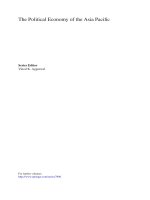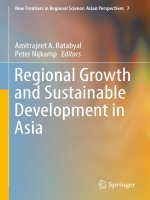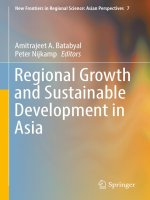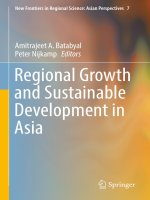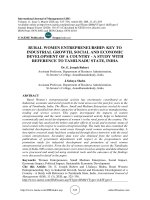Economic growth and economic development 225
Bạn đang xem bản rút gọn của tài liệu. Xem và tải ngay bản đầy đủ của tài liệu tại đây (63.06 KB, 1 trang )
Introduction to Modern Economic Growth
The evidence reported here, which exploits differences in colonial experience
to create an instrumental-variables strategy, is based on Acemoglu, Johnson and
Robinson (2001, 2002). The urbanization and population density data used here are
from Acemoglu, Johnson and Robinson (2002), which compiled these based on work
by Bairoch (1988), Bairoch, Batou and Ch`evre (1988), Chandler (1987), Eggimann
(1999), McEvedy and Jones (1978). Further details and econometric results are
presented in Acemoglu, Johnson and Robinson (2002). The data on mortality rates
of potential settlers is from Acemoglu, Johnson and Robinson (2001), who compiled
the data based on work by Curtin (1989, 1998) and Gutierrez (1986). That paper
also provides a large number of robustness checks, documenting the influence of
economic institutions on economic growth and showing that other factors, including
religion and geography, have little effect on long-run economic development once the
effect of institutions is controlled for.
The details of the Korean experiment and historical references are provided in
Acemoglu (2003) and Acemoglu, Johnson and Robinson (2006).
The discussion of distinguishing the effects of different types of institutions draws
on Acemoglu and Johnson (2005).
The discussion of the effect of disease on development is based on Weil (2006) and
especially on Acemoglu and Johnson (2006), which used the econometric strategy
described in the text. Figures 4.15 and 4.16 are from Acemoglu and Johnson (2006).
In these figures, initially-poor countries are those that are poorer than Spain in 1940,
and include China, Bangladesh, India, Pakistan, Myanmar, Thailand, El Salvador,
Honduras, Indonesia, Brazil, Sri Lanka, Malaysia, Nicaragua, Korea, Ecuador, and
the Philippines, while initially-rich countries are those that are richer than Argentina
in 1940 and include Belgium, Netherlands, Sweden, Denmark, Canada, Germany,
Australia, New Zealand, Switzerland, the United Kingdom and the United States.
Young (2004) investigates the effect of the HIV epidemic in South Africa and reaches
a conclusion similar to that reported here, though his analysis relies on a calibration
of the neoclassical growth model rather than econometric estimation.
4.10. Exercises
Exercise 4.1. Derive equations (4.3) and (4.4).
211



